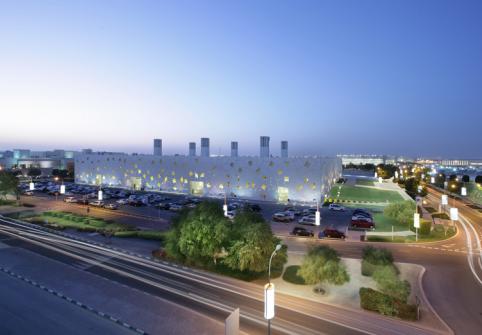News
New Reservoir Simulator Development at HBKU Aims to Optimize Qatar’s Oil and Gas Industry
26 Dec 2018
Researchers at Hamad Bin Khalifa University (HBKU) are currently developing a reservoir simulator that aims to optimize the oil exploration and extraction process, and tailor it to the specific geological and physical characteristics of oil and gas fields in Qatar.
Dr. Ahmad Sami Abushaikha, assistant professor at HBKU’s College of Science and Engineering’S (CSE) Sustainability Division, is spearheading the initiative through a research grant awarded by Qatar National Research Fund (QNRF)’s National Priorities Research Program (NPRP) in June 2018. The program aims to build human capital in Qatar by funding research that is able to positively impact the nation, region and world.
As a recipient of Cycle 10 of QNRF’s flagship funding program, Dr. Abushaikha and team members from Delft University and Stanford University are conducting research to develop a state-of-the-art reservoir simulator model that accurately mimics fluid flow at the subsurface level.
“The majority of hydrocarbons are stored deep beneath the earth’s surface, and we don’t really have accurate knowledge of what is exactly going on down there. One way for us to predict how to extract oil, or to develop an optimum production strategy, is to develop a model with the accurate physics and material properties that would mimic the accurate flow of hydrocarbons at the highly heterogonous subsurface” explains Dr. Abushaikha.
“Our goal is to develop a Qatari reservoir simulator to model these physical phenomena and work with the oil and gas industry in Qatar. One of our end-users is North Oil, who manages the Al Shaheen oil field where approximately 400,000 barrels are produced per day, accounting for 60 to 80 percent of Qatar’s oil production.”
Dr. Abushaikha and his team set about working on a reservoir simulator, using software, physics, and advanced numerical schemes to predict the flow more accurately than the industry is currently able to.
Although all oil companies employ reservoir simulators, the one being developed by Dr. Abushaikha has a significant number of features that differentiate it from existing models. It will be able to add different physics and properties to a scenario to enhance development strategies and maintain a certain plateau of extraction. When completed, the simulator will run thousands of scenarios to ascertain an optimum strategy, to achieve a steady and desired output.
“The software will have advanced discretization schemes coupled with geo-chemical and geo-mechanical modelling specifically designed for the carbonate nature of Qatar’s hydrocarbon reservoirs,” says Dr. Abushaikha. “Existing simulators lack these capabilities that enable us to predict what would happen during an enhanced recovery process; for example, and how an injected fluid reacts and effects the carbonate rock formations and properties. This simulator will be able to model these activities and many more through various reservoir characterization scenarios such as fractured reservoirs and highly complex domains.
“One of the most important advantages of our simulator is the capability to run in super-computers at Education City, so it will be able to do billions of calculation at high speeds to model precisely how oil can be extracted in these situations and determine the financial viability of exploration projects.”
The CSE assistant professor has completed the initial phase of testing, and development will move towards application in the coming months.
Much like other mineral-rich countries in the region, there is a shift in Qatar towards economic diversification, but Dr. Abushaikha believes that reservoir simulators are key to an effective and economically viable production output even during this transition period.
“Reservoir simulators are the crown jewel of each and every oil company – they are your eyes at the subsurface reservoir. They are used to justify development strategies to shareholders, apply for bank leverage, and forecast production.”
When completed, the simulator will provide further evidence of the impact being made by specialists within Qatar’s research, development, and innovation ecosystem.
“The project and many others are part of my research group at CSE-HBKU, QASR- Qatari Advanced Simulations for Reservoirs (www.qasr.qa), that are contributing towards a knowledge-based economy for Qatar through research, development, innovation and building local capacity and talent.”
